Next time you’re reaching for that chain store coffee, you might want to pause. Recent investigations have exposed concerning practices at major coffee corporations that extend far beyond just serving mediocre drinks. From deceptive marketing to questionable sourcing practices, here’s why you might want to rethink your regular coffee spot.
Starbucks struggles with ethical sourcing claims

The world’s largest coffee chain is facing serious scrutiny over its ethical sourcing claims. A recent lawsuit alleges that Starbucks sources coffee from farms with documented human rights violations, despite marketing its products as “100% ethical.” The company’s largest Brazilian supplier was accused of conditions “analogous to slavery” and illegal trafficking of workers.
While Starbucks maintains its C.A.F.E. Practices program evaluates suppliers using over 200 indicators, the data shows only 98.2% of its coffee meets these standards. What happens in that remaining percentage? The allegations include child labor, forced labor, and gender-based violence at supplier farms.
Dunkin brands face pricing and quality concerns
While positioning itself as the more affordable alternative to Starbucks, Dunkin’s pricing strategy raises questions. The chain’s expansion has led to inconsistent quality across locations, with many customers reporting watered-down beverages and stale products. If you paid $5 for a coffee that tastes like it cost 50 cents to make, you might wonder where that money really goes.
The standardization of coffee preparation at large chains often results in over-roasted beans to maintain consistency across thousands of locations. This practice masks the actual quality of the coffee while allowing for higher prices that don’t reflect the product’s true value.
Dutch Bros rapid expansion affects consistency

The rapid growth of Dutch Bros has created its own set of problems. The drive-through model, while convenient, often results in rushed preparation and lengthy wait times. Their expansion strategy has led to training inconsistencies, affecting drink quality across new locations.
Consider this: What happens when a company opens hundreds of new locations without enough properly trained staff? The result is often a diluted product that barely resembles what built the brand’s initial success.
Costa Coffee’s automation over authenticity
Costa Coffee’s increasing reliance on automated machines removes the craftsmanship from coffee making. While automation can ensure consistency, it also means you’re paying premium prices for essentially machine-made beverages. The company’s cost-cutting measures often translate to reduced training for baristas and less attention to individual drink preparation.
The standardization of their menu items across international locations often means compromising on local coffee preferences and traditions. This one-size-fits-all approach might work for fast food, but it goes against the very essence of what makes coffee special.
Caribou Coffee’s supplier transparency issues

Despite marketing campaigns highlighting sustainability, Caribou Coffee faces criticism over supplier transparency. The disparity between bean prices and retail prices remains a significant issue, with farmers earning minimal profits while retail prices continue to rise.
The company’s recent shift toward more licensed locations has resulted in varying standards across different venues. This franchise model often prioritizes profit margins over maintaining consistent quality and ethical sourcing practices.
Next time you’re considering your coffee options, remember that alternatives exist. Independent coffee shops often maintain direct relationships with farmers, ensuring fair compensation and higher quality products. Your choice of where to buy coffee impacts not just your wallet but entire communities involved in coffee production.

